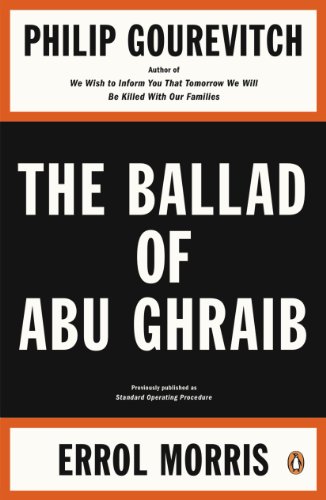The Ballad of Abu Ghraib
Philip Gourevitch; Errol Morris
BOOK REVIEW

In the haunting echoes of war and human depravity, The Ballad of Abu Ghraib emerges as a chilling chronicle of the darkest corners of the human soul. Co-authored by Philip Gourevitch and Errol Morris, this compelling narrative dissects the infamous torture scandal of Abu Ghraib prison during the Iraq War, forcing us to confront the specter of moral failure that looms over those embroiled in conflict. ⚔️
This book is not merely a recounting of events; it is an emotional plunge into the abyss of humanity. Gourevitch's incisive prose, layered with Morris's evocative imagery, compels readers to grapple with the grievous consequences of war-a landscape fraught with anguish, shame, and confusion. The authors dissect the photographs that became synonymous with human rights violations, revealing the monstrous truths hidden behind those kaleidoscopic frames of agony. It's a brutal reminder that these aren't just images; they are testimonies of dehumanization, where soldiers became both perpetrator and pawn, entrapped in a web spun by ideology and command.
Readers' reactions to this book are as complex as the story it tells. Some hail it as a groundbreaking investigation into the ethical morass of modern warfare, serving as a wake-up call to a nation that chose to look away. Others find it unbearable to digest, accusing the authors of sensationalizing pain. But regardless of where one stands, the unsettling reality remains: we're confronted with the uncomfortable truths about ourselves, our governments, and our inability-or unwillingness-to act.
What makes The Ballad of Abu Ghraib so profoundly important is how it beckons us to reflect on our collective complicity in these atrocities. As Gourevitch meticulously lays out the timeline of events, he forces the question: what does it mean to be human when faced with such horrors? Are we mere observers, or do we share in the guilt of ignorance? This book is a mirror, held up to our society, challenging us to look deeper, to understand the context of these barbaric acts, and perhaps even to change.
It's imperative to grasp the historical context within which this narrative unfolds. Abu Ghraib became a focal point for discussions about the morality of the Iraq War and the psychological impacts of torture. The scandal ignited debates that transcended borders, influencing international perspectives on American military actions and leading to significant shifts in public opinion. This book, therefore, isn't just a story about a prison; it's a commentary on the American ethos during wartime-a collection of identities grappling with the inconceivable burdens of their actions.
The emotional impact of this work cannot be overstated. Readers often find themselves teetering on the brink of despair, grappling with the weight of each revelation, feeling the suffocating pressure of inaction. The ballad sung here resonates with pain, reflecting the struggles faced not only by individuals in distant lands but echoing the internal conflicts each of us grapples with when we confront the uncomfortable realities of our own society.
Ultimately, The Ballad of Abu Ghraib is a call to awakening-a plea for understanding, empathy, and responsibility. It's a stark reminder that silence and complicity are forms of endorsement. As you journey through the pages, you'll be haunted by the images and stories until you feel an insatiable need to act, to speak out, and to become a part of the solution in a world where too often, we remain passive observers. 🌍
This is not just a book about the past; it's a torch illuminating the path forward, urging us to engage with the present. Read it, digest it, and allow it to transform your understanding of humanity and its frailties. Your awakening might just ripple out to affect greater change than you ever thought possible. Are you ready to take that step?
📖 The Ballad of Abu Ghraib
✍ by Philip Gourevitch; Errol Morris
🧾 314 pages
2009
#ballad #ghraib #philip #gourevitch #PhilipGourevitch #errol #morris #ErrolMorris